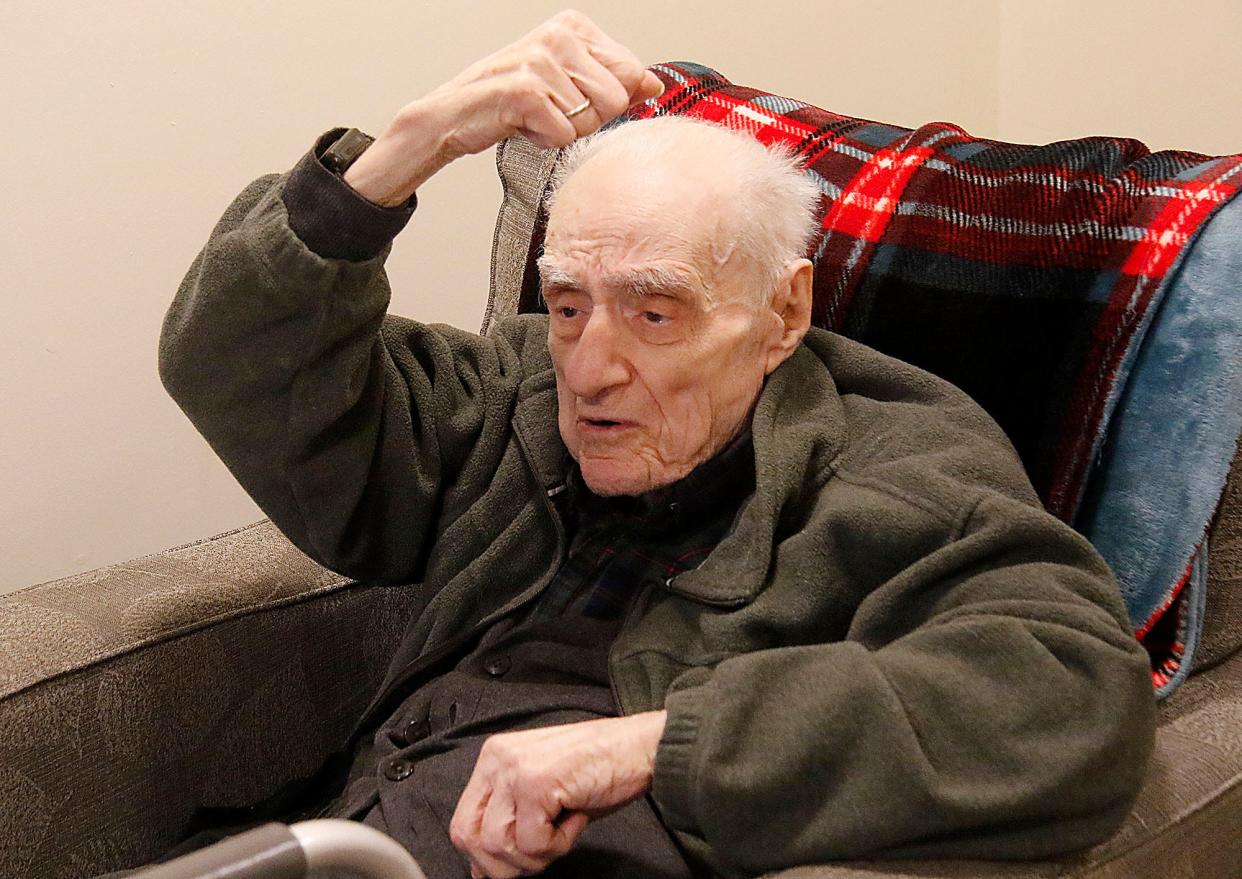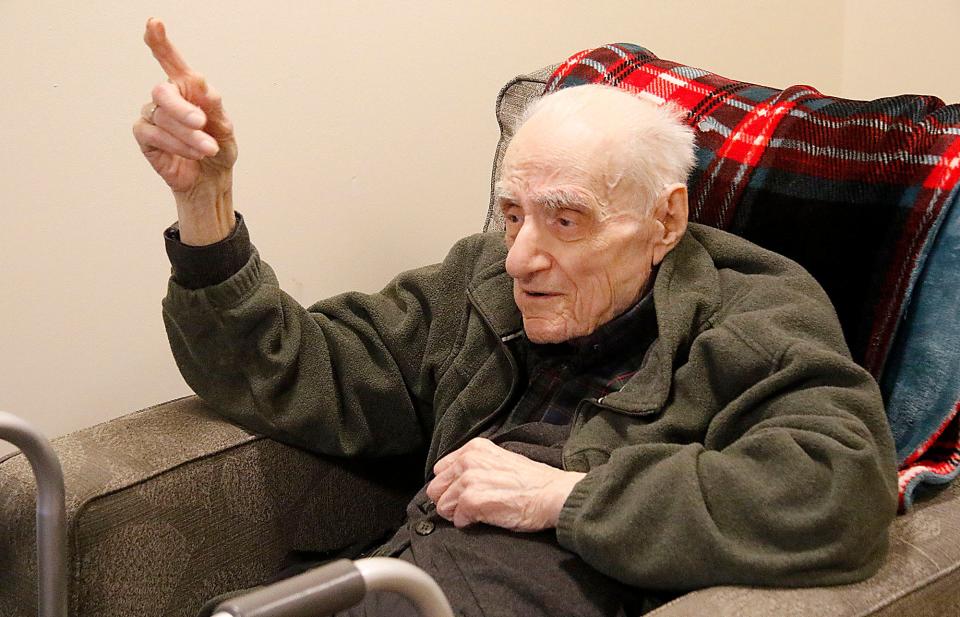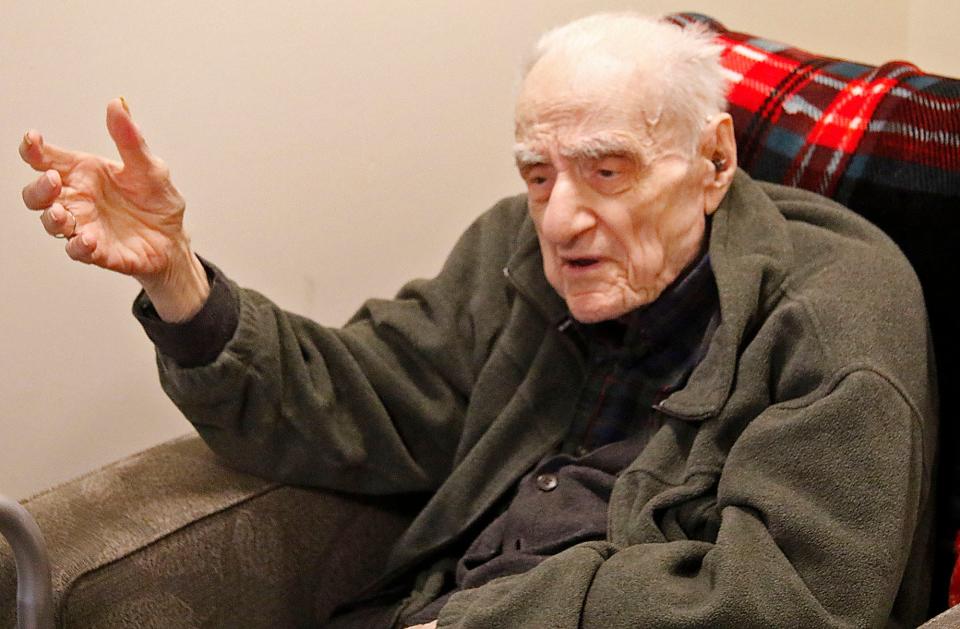From Greece to Ashland: How a WWII prison camp survivor found his way to Ohio

ASHLAND – The 100-year-old Lutheran Village resident, with slicked-back white hair, salt and pepper eyebrows and a soft Greek accent, has a story hidden in his century-old mind.
Speros Karas has tales and knowledge spanning the globe that are only revealed to the world when asked.
Stamped with love: Ashland County woman sends birthday card to WWII vet she's never met
If not, you wouldn't know he was born in Greece, where his village was burned to the ground when he was 20.
You wouldn't know he was a prisoner of war for six grueling months. Each day he would ask himself: "I wonder if I'm going to be alive the next day."
And you wouldn't know how he managed to get himself to Ashland, Ohio, where he made a new life.
Speros Karas: From engineering student to German prisoner of war
Karas, living in Kakosi, Greece, had an undeniable passion for tinkering and repairing that drew him to clocks and watches. Those skills would come in handy later in life.
Indoor water park enters Kroc Center: Cannonball! Indoor water park and fitness center set to open at Ashland Kroc Center
His family ran a modest coffeehouse, where food was served along with a place for patrons to sleep for the night.
Life was good. Then the invaders came.
"The Germans are coming! The Germans are coming!" became a familiar refrain in Greece during World War II in mid-1941.
Karas and his parents would flee to a cave hidden away on a mountaintop, a mile from their home. Other villagers would follow, often hiding in nearby caves whenever the Germans visited Kakosi.
Their efforts to remain out of sight were ruined one day when Karas' mother carried a pail of water up the mountainside toward their hiding spot. A German soldier noticed and followed her.
Once found, the soldiers took Karas to a German prison camp due to his young age as they thought he was ready to work. His mother, father and sister were spared, due to Karas' father's age.
Their village would be burned to the ground. Some residents were killed by gunfire as Germans swept through houses and stole food, especially rarities like meat. Other young men, like Speros, were captured and taken back to the German prison camp for manual labor.
It was the hardest six months of his young adult life.
'I thought they were going to shoot us'

His life as a POW is difficult for the 100-year-old to recall now. The memories are a bit scattered, often forgetting details he had told his son, Meletios, in the past.
What Karas can remember is somber and haunting, evoking strong emotions to this day.
Karas' bed was a ditch he dug himself in the ground. There was no mattress or pillow after a long day of manual labor.
For food, Karas would eat soup with flies floating across the top. It was the same meal each day.
"I don't know how he survived," Meletios said.
Death was around every corner.
Karas was terrified when he heard planes above, afraid of bombs raining down.
One afternoon, Karas was talking with a friend at the camp. A German soldier walked up unannounced and shot the friend point-blank in the head.
The bullet ended up lodged in Karas' left shoe.
He was never sure if he would be alive the next day.
After six months, German soldiers told the prisoners to gather in a truck. Karas didn't know why they were leaving or where they were going.
Eventually, he figured out he was headed back home.
After Karas arrived at his burnt village, he feared getting out of the truck.
"I thought they were going to shoot us," Karas said. Eventually, they were forced out and left to fend for themselves.
Karas met his family at a nearby church, where they stayed until Karas built a stone house for his family.
When the house was finished, the young man set up a workshop outside where he sold homemade plates, silverware and other oddities.
But life was no longer sustainable there. There simply wasn't a way to make a living in Greece after the war for Karas' family.
How did Karas end up in Ashland?

Without steady employment and sustainable income, Karas seized on an opportunity to come to the U.S. in 1951.
His uncle, Pete Karas, owner of an Ashland restaurant now known as Peking Restaurant on E. Main Street, allowed Karas to work for him, giving him a roof over his head. So that's where he went.
Karas' father had routinely traveled and worked at Pete's restaurant, bringing his earnings back to Greece due to the poor economy.
He arrived in the U.S. aboard a ship named Brazil, one suitcase strapped together by a leather belt, he said, and made his way to Ashland.
After working with his uncle, Karas worked at Myers factory and fell in love with repairing watches and clocks as a side gig in his home.
He was able to do that until age 93, when he retired due to declining vision.
Karas never dwelled on his time in that prison camp.
It's "something that wasn't talked about," said his cousin, Mary Gault. "At that point in time, nobody ever paid attention to that stuff."
Reach Grant at gritchey@gannett.com
On Twitter: @ritchey_grant
This article originally appeared on Ashland Times Gazette: WWII prisoner of war survivor makes his way from Greece to Ashland

